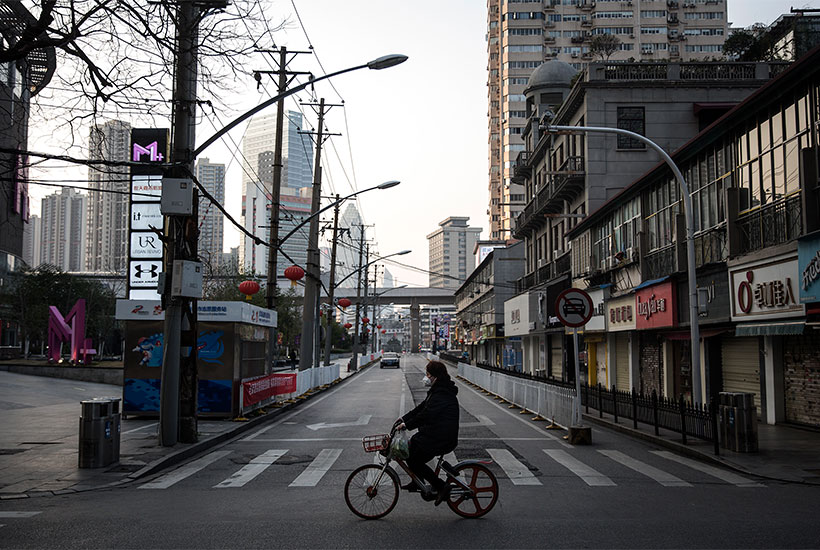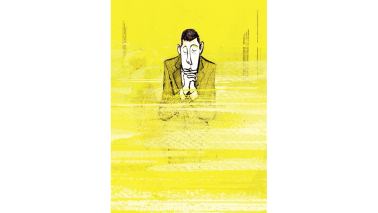‘Lourdes shrine closes healing pools as precaution against coronavirus,’ says a discouraging headline in the Catholic Herald. Jesus ‘made the lame to run’ and ‘gave the blind their sight’, but Christians are not like Jesus, however much they may try to imitate him. We lack miraculous powers; and so, in matters of life and death (though not of the afterlife), we must defer to the civil power. On Tuesday, our neighbour rang for my wife, who is a churchwarden, and asked: ‘Shall I open the church as usual this morning?’ After some rummaging on the diocesan website, she found that the answer, following Boris Johnson’s broadcast the night before, was ‘No’. The same applies to the Catholic church I attend. Once the virus was spreading and until the Prime Minister’s broadcast, there were no services of any kind, but a chapel had been open for prayer in front of the Tabernacle. Now, nothing. Obviously this does not, ultimately, matter. God ‘dwelleth not in temples made with hands’. But it is surprising how upsetting the deprivation is. Bishops put out reassuring messages about how the Church lives all the same; but, just now at least, it does not much feel like that. There is a sense of uselessness.
So our parish has established a system of ‘phone buddies’ and ‘shopping buddies’ for fellow parishioners who are over 70 and self-isolating. I am one of the phone ones. I speak every other day to Joan, our organist, who has bad lungs and lives up a steep flight of steps in a neighbouring village. The scheme is a very good idea, and I think Joan is pleased. But the fact is that, unless one is a hermit, the life of the Church is physically communal. Indeed the ancient Greek for church, ecclesia, means originally (see Liddell and Scott) ‘an assembly of the citizens summoned by the crier’. Now the crier is telling the citizens to disperse. One must obey, but it is quite traumatic. The hope is that, once we are allowed to reassemble, we will value more deeply what we share.
The inability to gather together has a political effect too. Here is Harold Nicolson, writing 79 years ago next week — 1 April 1941 — during the Blitz: ‘In the smoking-room Winston sits down and has his glass of Bristol Milk and is prepared to answer questions. Members cluster round him rather ingratiatingly. “How well you are looking, Prime Minister.” He does in fact look better than I have seen him for years. All that puffy effect has gone and his face is almost lean, with the underlip pouting defiance all the time. He says: “Yes, I am well. I am in fine trim. More than I was this time last year. We are doing well. We have a real Army now. We have tanks — good tanks. We have guns. In the air our position is not merely absolutely but relatively stronger.”’ Now, there is no smoke in the smoking-room and even if there were, MPs could not cluster, ingratiatingly or otherwise, round Boris to give him strength and derive strength from him. Despite the oddity of MPs sitting seven feet apart on the green benches, it surely matters to get the place back from its early recess as soon as possible. As the emergency continues, government will claim ever more sweeping powers and accuse any objectors of obstructionism. But obstruction is often the job of MPs, and they will not be able to obstruct properly if the government follows the calls of the anti-parliamentary Electoral Reform Society and allows everything to be done by proxy voting.
A blackly comic example of what government can do in a rush appeared on Monday. The Department of Health announced that it was now allowing telemedicine (e.g. FaceTime, Skype) ‘DIY’ abortions which women could perform on themselves at home without a doctor or a medical professional present. This major ethical and medical change was effected by tweet, without any parliamentary scrutiny or consultation. A few hours later, the government admitted that this tweet was an error and the law had not changed.
One recognises the need for firm rules about social distancing and other measures to control the coronavirus spread; but one should also recognise the need to keep things going. We rightly hail the NHS workers. We should also applaud the tremendously efficient businesses which continue to supply grocers’ shops and pharmacies. Given the difficulties and sudden demands, I am amazed by how well these markets are holding up. What on earth would Covid-19 have been like if it had arrived in pre-internet days?
The authorities should themselves recognise difference of circumstances and adjust the rules accordingly as things change over the coming weeks. Take the construction industry. It is obvious that large numbers of workers congregating for major building projects in cities will not be able to work without breaking the rules of social distancing. Is the same true of three men working outdoors on a barn roof? Take walking. You cannot let thousands gather in London parks, but there are rural footpaths away from tourist spots all over Britain which are almost completely unfrequented. So long as people do not have to park cars to get to them, should such strolls be banned? The priority is to save lives, but the psychological and economic damage done by enforced idleness is also genuinely dangerous. ‘Whatever it takes’ should not mean ‘Clutch at the most extreme measure available’.
For the time being, one must make friends of apartness. Here is Walter Scott, on the same date as this week’s edition, in 1826. He was at home in the country at Abbotsford, working incessantly to write himself out of insolvency, and his wife was near death: ‘We have now been in solitude for some time — myself nearly totally so excepting at meals… One is tempted to ask himself, knocking on the door of his own heart, Do you love this extreme loneliness? I can answer conscientiously, I do.’







Comments